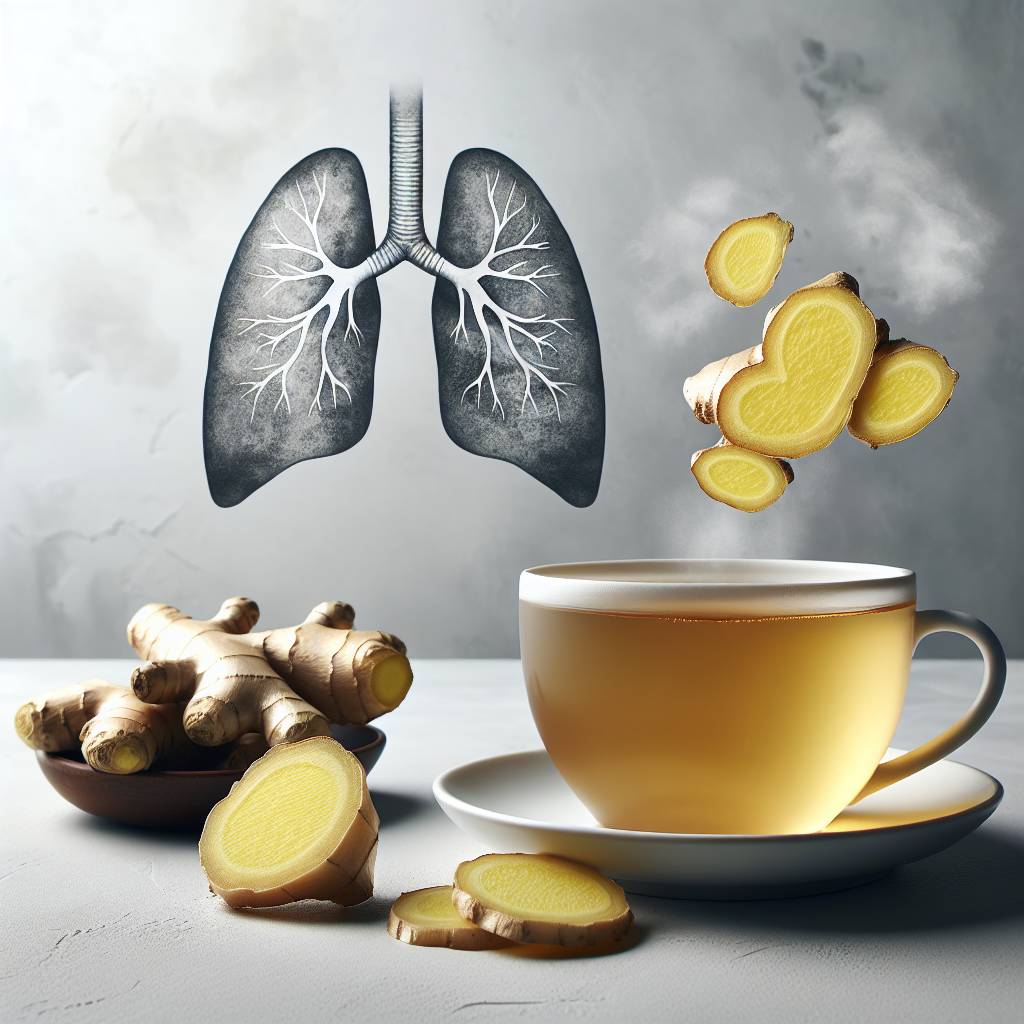How does ginger tea impact asthma symptoms?
Ginger tea can help ease asthma symptoms by reducing inflammation in the airways. This natural remedy works because ginger has anti-inflammatory properties that may help relax the muscles around the airways, making breathing easier. Drinking ginger tea regularly might offer some relief to people with asthma, helping them manage their symptoms better.

What are the active components in ginger tea that can affect asthma symptoms?
Ginger tea contains several active components that can influence asthma symptoms, with gingerol being the most significant. Gingerol is known for its anti-inflammatory and antioxidant properties, which play a crucial role in soothing inflamed airways. This compound helps in reducing the inflammation that narrows air passages and makes breathing difficult for people with asthma.
Besides gingerol, shogaols and zingerone are other compounds found in ginger that contribute to its therapeutic effects. These substances also possess anti-inflammatory qualities, further aiding in the relaxation of muscles around the airways. This relaxation can help reduce the severity of asthma attacks and improve overall respiratory function.
Can drinking ginger tea reduce inflammation in the airways of people with asthma?
Yes, drinking ginger tea can help reduce inflammation in the airways of individuals suffering from asthma. The anti-inflammatory properties of ginger work by inhibiting certain enzymes and genes involved in the inflammatory process. By doing so, ginger tea can decrease swelling and irritation in the bronchial tubes, making it easier for asthmatics to breathe.
Research has shown that regular consumption of ginger tea may lead to a reduction in airway inflammation over time. This effect not only helps alleviate current asthma symptoms but may also contribute to fewer asthma flare-ups. However, it’s important to note that while beneficial, ginger tea should be used as a complementary treatment rather than a primary therapy for managing asthma.
Explore teas for asthma relief! Learn about the best types and brewing tips for easing symptoms naturally.
How does ginger tea compare to traditional asthma treatments?
Ginger tea serves as a natural complement to traditional asthma treatments rather than a replacement. While conventional medications such as inhalers and corticosteroids directly target the mechanisms causing asthma symptoms, ginger tea works indirectly by reducing inflammation and supporting respiratory health. Its natural anti-inflammatory effects offer a gentler alternative or supplement to standard medical treatments.
However, it’s essential for individuals with asthma to consult their healthcare provider before incorporating ginger tea into their treatment regimen. Although beneficial, natural remedies like ginger tea cannot match the immediate effectiveness of prescription medications during an acute asthma attack. Therefore, it should be viewed as part of a broader approach to managing asthma rather than a standalone solution.
What is the recommended way to prepare and consume ginger tea for asthma relief?
To prepare ginger tea for asthma relief, start by peeling and slicing fresh ginger root into thin slices. Add these slices to boiling water and let them simmer for about 10-15 minutes depending on how strong you prefer your tea. This method allows for maximum extraction of beneficial compounds like gingerol into the water.
After brewing, strain the pieces of ginger from your tea and allow it to cool slightly before drinking. For added benefits and flavor, you may also include honey or lemon juice according to taste preferences. Drinking one or two cups daily can help manage mild asthma symptoms alongside conventional treatments prescribed by your healthcare provider.
| Effect | Description |
|---|---|
| Anti-inflammatory | Ginger contains compounds like gingerols and shogaols that have anti-inflammatory properties, potentially reducing airway inflammation in asthma. |
| Bronchodilation | Some studies suggest ginger may help relax the airways, improving breathing in people with asthma. |
| Antioxidant | Ginger’s antioxidant effects can combat oxidative stress, which is linked to inflammation and asthma. |
| Mucolytic | Ginger may help break down mucus, making it easier to clear from the lungs and improving symptoms of asthma. |
| Immunomodulatory Effects | Ginger might modulate the immune system’s response, potentially benefiting those with allergic asthma by reducing hypersensitivity reactions. |
Are there any potential side effects of using ginger tea as an asthma remedy?
Ginger tea is generally considered safe for most people, but it’s important to be aware of possible side effects. Some individuals might experience mild heartburn, diarrhea, or stomach discomfort after drinking ginger tea. This is especially true if consumed in large quantities.
People with certain health conditions should exercise caution. For example, those with bleeding disorders or individuals taking blood thinners should consult their doctor before adding ginger tea to their diet. Ginger has natural blood-thinning properties which could potentially increase the risk of bleeding.
How quickly can one expect to see improvements in asthma symptoms after starting to drink ginger tea?
The time it takes to notice an improvement in asthma symptoms after drinking ginger tea can vary from person to person. Some may feel better within a few days, while others might need a few weeks to observe any significant changes. It largely depends on the individual’s body response and the severity of their asthma.
Consistency is key when using ginger tea as a complementary treatment for asthma. Drinking it regularly can help maximize its potential benefits on respiratory health. However, it’s crucial not to rely solely on ginger tea and continue following any prescribed treatments by healthcare professionals.
Can ginger tea be used in conjunction with other natural remedies for enhanced benefits against asthma?
Yes, combining ginger tea with other natural remedies could potentially enhance its benefits against asthma. For instance, incorporating honey or turmeric into your ginger tea not only adds flavor but also brings additional anti-inflammatory properties that may help soothe the airways further.
However, when mixing different herbs and supplements, it’s essential to do so cautiously and ideally under the guidance of a healthcare provider. They can help ensure that the combination is safe and won’t interfere with any existing medications or treatments you’re currently undergoing for asthma management.
Final Thoughts
Ginger tea offers a promising natural remedy for alleviating some symptoms of asthma due to its anti-inflammatory properties. While it can provide relief and improve respiratory health, it’s important not to view it as a standalone treatment but rather as part of a comprehensive approach that includes traditional medical treatments.
If considering adding ginger tea to your routine for managing asthma symptoms, consulting with a healthcare professional first is advisable. They can provide personalized advice based on your specific health needs and conditions, ensuring that you benefit safely from this natural remedy.






